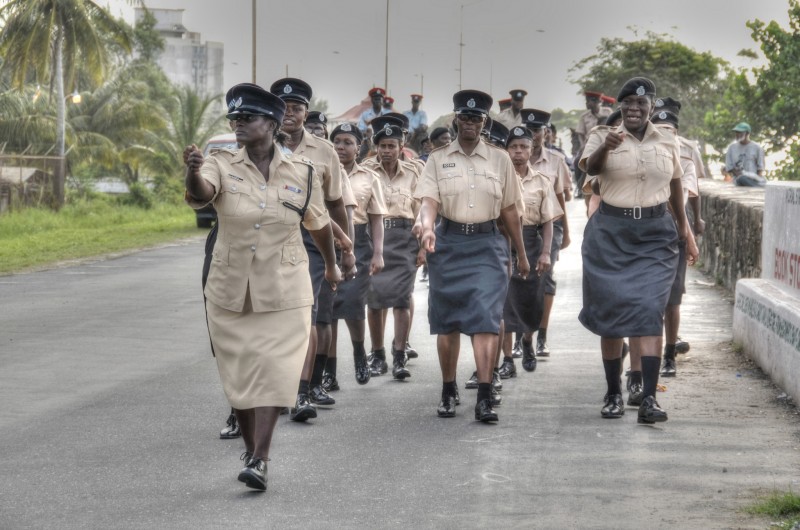When three members of the Georgetown City Constabulary [2] were dismissed [3] earlier this month for becoming pregnant while they were still on probation, Guyanese [4] netizens spoke out about the controversial move, which also got the attention of Amnesty International Caribbean [5]. The women eventually got their jobs back, but the road to that decision and the ground still left to cover in Guyana is considerable.
Twitter user Mark Jacobs didn't understand why people thought the police were being unreasonable when it dismissed the three women:
I fail 2see anythin discriminatory abt askin women not to become pregnant durin trainin in police/military org #Guyana [6] CONTRACEPTION. use it
— mark jacobs vive! (@emarkjacobs) August 7, 2015 [7]
Several women online said the police service's policy is what doesn't make sense today:
Guyana MUST amend its old rules. It does not make sense really that in today's world, women can be dismissed as… http://t.co/8LLnmpaneK [8]
— Nyaradzayi (@vanyaradzayi) August 7, 2015 [9]
The fact that, in 2015, women are still being discriminated against on the grounds of pregnancy has left some dumbfounded, but the situation is perhaps more complicated that some believe. In a public discussion about the issue on the Stabroek News’ Facebook page, for instance, Yonnette Kennedy shared [10] her personal experience:
The law was there all the time people […] they told you that when you go for the job if you get pregnant before a year you [are] on duty you have to leave, you have one year probation before you get pregnant, it happened to me 23 year[s] ago, and I leave because I know that was [sic] the rules, I know it [is] not right to dismiss someone because they are pregnant, but they knew that before they take the job.
Lorette Watson agreed [11] that the women knew what they were getting into:
For whatever reason, I think young people don't take rules and regulations seriously and this is a example for them sorry it had to happen while they are pregnant but the rule is the rule.
Facebook user Rawle Chalmers expressed his irritation [12] at the “bureaucratic assholes who keep turning back the clock on women issues,” while another commenter wondered [13] about maternity leave, and Donnella Collison said [14]:
I hope more women that lost their jobs under these circumstances come forward so that this archaic can finally be changed.
Though both Guyana's constitution [15] and the Prevention of Discrimination Act [16] prohibit such dismissals, the three women (according to the termination letters) were in violation of departmental policy that bars female constabulary officers from becoming pregnant within the first two years of probation.
The development (pregnancy) constitutes a clear violation of the City Constabulary Standing Order section 4:11(Para) J11.
As if those dismissals weren't enough, a former policewoman, 19-year-old Abassie Bobb, told the Guyanese press [17] that she was dismissed in July of this year under a similar policy against pregnancy. Bobb claims she was dismissed after confiding to her superiors that she was with child. The dismissal letter stated that her services where being terminated in accordance with the Guyana Police Act [18].
According to Chief Constable Andrew Foo, the policy under which the female constables were fired is “an age-old one,” and while it may appear discriminatory, it should not be amended, he says. His fear [19] is that “a great percentage of females [in the constabulary] could become pregnant.” Although the provisions within the policy are older than Guyana's 1980 Constitution and even the country's 1997 Prevention Against Discrimination Act [16], Foo reportedly believes that the policy is up-to-date because he helped revised it in 2013.
One female constable, Laurel Gittens, recently defended the policy [20], saying that leniency in this regard would put a tremendous burden on the police service.
It would put a burden on the organization if we allow women to become impregnated during probation…the pregnancy constitutes a clear violation of the City Constabulary Standing Order Section 4:11 (Para) J11
At the time, Gittens emphasized that any change in the policy would have to be made by Parliament. She also claimed that police command is tolerant, and women are able to take leaves of absence and return quietly to work, after giving birth.
The subsequent protest [21] staged outside the capital's City Hall got the attention of the powers that be: the sacked constables have since been reinstated [22].
It may eventually be up to the Guyanese people to decide whether or not any pending Constitutional Reform requires amendments to an archaic policy that continues to stand up from the country's other, more modern laws. Many feel that a policy that discriminates against women—especially women trying to serve their country—should no longer be allowed.
